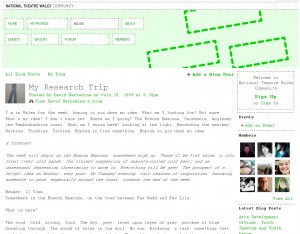We’ve been working with National Theatre Wales on their online community strategy. Earlier this year we unveiled a social site based on the Ning platform.
It’s similar to Facebook in some ways except that it allows a level of detailed conversation probably not possible before. We’ve had many people join and, importantly, participate on there – actors, writers, directors, technical people and of course audience (like me).
NTW wanted something which would complement and support their work and their ethos of boldness, openness and experimentation. National Theatre Wales are like the host of a party – on the site there’s a great deal of freedom in the topics you can discuss. Feel free to sign up and try it.
If you want to be precise about terminology you could say it’s both a “social network” site and a “social networking” site. It’s a subtle difference in wording but a big difference in practice. In other words, it not only supports existing connections between people (like Facebook friends) but encourages new connections to form between people who wouldn’t otherwise know each other. (If you’re interested in some background to this distinction, check out USA-based researcher danah boyd’s thoughts in this area. Not for everyone but you might like it.)
So it’s been fun to work on the site – with NTW and their visual branding partners Elfen – and now see people discussing things and blogging about theatre and related topics. And it’s genuinely exciting to think that people will meet “in real life” and work on new projects together as a result of this online community and the various groups it now holds.
Currently we’re gearing up to November’s announcements of next year’s theatre events. More news soon.
In the meantime, here’s a great example of a discussion which resulted from a blog post.

The Machine is (Changing) Us – New talk by Mike Wesch
Mike Wesch of Kansas State University is among our favourite commentators on social media and culture.
Here’s a new 33-minute talk from him called The Machine is (Changing) Us – YouTube and the Politics of Authenticity. (I said ‘new’ but he does reuse some parts from a previous talk about YouTube which you may have seen).
In the course of this entertaining talk he mentions: Neil Postman’s ‘Amusing Ourselves To Death’, television, George Orwell, Aldous Huxley, Marshall McLuhan, free hugs, narcissism, a history of “whatever”, a brief history of “meh”, video blogging, Kurt Cobain and Nirvana. It’s well worth a look.
We just watched the video over a huge curry lunch. Let’s just say we don’t think we’ve fully digested either yet…